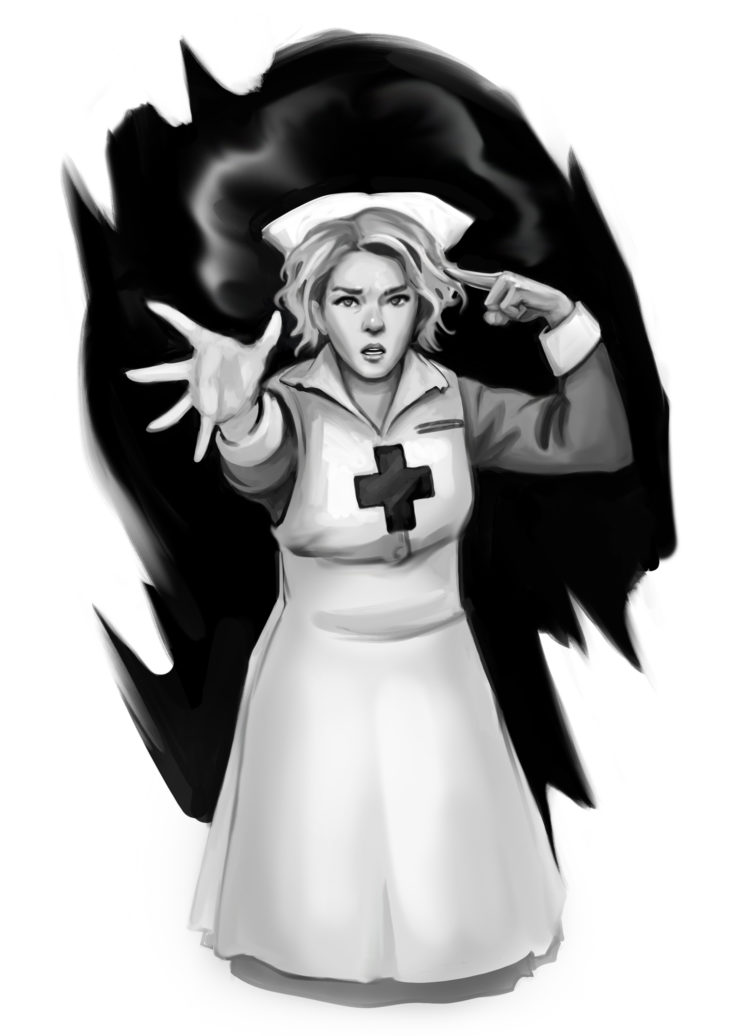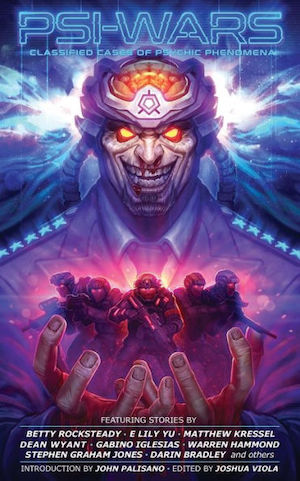We’re excited to share an excerpt from Psi-Wars, an anthology of original science fiction and horror from editor Joshia Viola—available now from Hex Publishers. Read a selection from Angie Hodapp’s “Cradle to Grave” below!
From Atlantis to the Third Reich and beyond, these thirteen original cerebral tales of science fiction and horror explore the evils that abound when humanity wields extraordinary minds as weapons, whether to wage war or prevent it. Steeped in psychic savagery, telekinetic combat, and extrasensory espionage, Psi-Wars imagines corrupt governments and daring operatives, gods and soldiers and hackers and spies. The authors don’t flinch when they peer around the darkest, most violent corners of the human psyche. Will you?
Cradle to Grave

Just past tea on a sunny Tuesday in June 1917, two women met on the bridge in London’s St. James’s Park. The elder, who was called Mrs. D., wore a beplumed hat with a wide brim that, when she offered a perfunctory embrace, knocked the more sensible straw boater of the younger woman askew.
“What’s it to be this time?” said the younger woman, who answered to many designations, depending upon the situation, but whose given name was Edith.
“We’re sending you to Rouen.”
Edith rested her gloved hands on the bridge’s stone balustrade and stared out over the water. She tried her best to appear nonchalant, as though the news had done nothing to excite her. In truth, her heart thundered in her ears. France. She had never been to France; neither had she been so close to the front. Until now, her missions for the Agency had been conducted on British soil, and they had been rather tame. Detect what the subject knows about X. Discern whether the subject is sympathetic to Y. Determine what was said to the subject when Z…and so on. Conventional interrogations were messy and strenuous. They took time and extracted questionable information. But Edith could step into another’s mind as easily as one steps into a warm bath and Sense truth in seconds.
France, however…France was field work. To Edith’s knowledge, she was the sole Sensitive in the Agency’s employ. As such, she was valuable. Mrs. D. would only send her afield if the mission required her particular gift.
“I’m listening,” she said.
“There’s been an incident at a British hospital there. A formerly British hospital. The Americans have taken over its operations.”
“Aren’t we on the same side?”
“Who can say for sure in such times as these? Here’s the crux of it. Last week, two Germans attempted to toss stick grenades into its basement.”
Buy the Book


Psi-Wars
Edith narrowed her eyes. “What of the treaties? Protections for those wounded in war?”
“The Conventions would have been flouted, yes, had the men succeeded. As it happened, they were thwarted before a single grenade was thrown. They managed to evade capture and cross back into Germany.” Mrs. D. nodded a how-do-you-do to an elderly couple strolling past. When they were clear of earshot, she said, “One of our operatives there reported that both men, upon their admission of failure, were shot by their commanding officer—a man named Schreiber.”
Edith took a moment to make sense of this. “Perhaps someone in that hospital has a German secret. A valuable one. So valuable that even the Americans aren’t yet certain they want to share it with their British allies.”
“That’s one possibility. We’ve confirmed that seven prisoners of war are convalescing there under guard.”
“Germans?”
“The obvious guess, but our intelligence has been inconsistent. Under usual circumstances, German prisoners would have been transported to the camp at Gironde.”
Edith tapped a finger against the stone. “Whoever those convalescents are, whatever they know, the Germans want them dead, yes?”
Mrs. D. nodded.
“They must have quite the secret.”
“You’ve been patient with the Agency, Edith. You’ve done everything we’ve asked you to do. But this mission is critical. We need you to get to the bottom of this.” She paused, drawing a slow breath. “We have reason to suspect that Matthew might be involved.”
Edith’s finger stopped tapping. All the warmth in her body drained away. She stood still as ice, careful to control any reaction that might betray the anger burning inside her. It had been three years since she saw her brother, two since his letters stopped. How long had the Agency been tracking him? What else did they know, and how dare they keep it from her?
“Nothing’s certain,” Mrs. D. continued. “We don’t know how he figures in, but should your paths cross, we need your word you’ll stay focused on the objective.”
Edith remained silent, eyes fixed on the sunlight glinting off the water. Could she promise such a thing? Could she swear she would choose duty over the only family she had?
That, she decided, was a bridge she could cross only when she came to it.
“Edith,” said Mrs. D. sharply. “Do we have your word?”
“Yes.”
Mrs. D. slipped an envelope under Edith’s hand. Identification papers, travel documents. “You’re going in as a volunteer nurse. Find out who those prisoners are. Find out what the Americans are up to.”
***
At the hospital in Rouen, every new volunteer did laundry. If after three days she was still willing to be of service, she was trained in the wards. So for three days, Edith scrubbed an endless boiling stew of soiled bandages and linens. The wash water was a constant, fetid slosh of blood, urine, shit, bile, pus, and whatever else saw fit to ooze, leak, or spill from soldiers’ broken bodies. Beneath her chambray dress, sweat drenched every inch of her skin. Her back hurt. Her shoulders ached. Her arms trembled from hours of turning the mangle. By the end of the third day, she could barely heft damp sheets over the clotheslines.
She used those days to Sense those around her, hoping to learn where inside the hospital the prisoners were being kept. As it was, the other volunteers were just as green as she was. Save for melancholy thoughts of sweethearts, brothers, husbands, and sons, Edith Sensed little but their preoccupation with the heat of the summer sun and the strain of their labors.
She had plenty of time to think her own melancholy thoughts. These she spent on Matthew. Sweet, brave, foolish Matthew, who’d raised her since she was twelve and he fifteen. Matthew, who saw to it after their parents died that she was clothed, fed, educated. Who taught her how use her gift—how to Sense.
He tried to teach her how to assert her gift, too. Shoving, he called it. When he shoved her, it felt as though she was hit by an electric jolt, a brief incapacitation. She never managed to shove him back.
But there was something she could do that he couldn’t. Cradling was her word for it. She could slip inside his mind and wrap it inside her own, rocking it as a mother rocks her child. He said it made his mind sluggish, like a bear drunk on honey, but also that it relaxed him and eased his pain. Since they were children, Matthew had been set upon by night terrors and migraines, and of all the salves and tinctures in his cupboard, only Edith’s cradling offered relief. He said that after each cradling, he felt sharp as a knifepoint.
Neither Edith nor Matthew knew any other Sensitives. They thought they were alone.
Then came the war.
Then the day three years ago when Matthew left.
He’d been recruited into some top-secret operation. “There are others like us,” he told her. “I can’t say more—it’s all very hush-hush—but we’ll be trained to work together, put to use.”
“Doing what?”
“Bringing an end to this bloody war, I suppose.”
“Then I can be of use, too, of course.”
Matthew looked at her sadly. “You’re a girl. You’re seventeen. They won’t take you.”
“They?”
He didn’t answer. Or couldn’t.
For the first year, there were letters. Each was full of rote cheer. We’re training very hard. We’re capable of so much more than you or I ever imagined! We’re like brothers. Brothers from many places. Don’t worry. We’re safe. Very soon, we will be put to use. Don’t worry, we are clever lads. We will be cautious. Don’t worry. Don’t worry.
Then the letters stopped.
Edith made inquiries. Her inquiries made her a nuisance. They also drew the attention of a tall woman of middle-age with a penchant for wide-brimmed hats. “You want to be of service, do you? Well, then, what skills do you have?”
Edith demonstrated.
Mrs. D. raised an eyebrow. “We’ve been looking for people like you. This brother you keep asking after—is he gifted too?”
“Yes.”
“We’d like to help you find him.”
Edith had always been good at reading between the lines. “But only if I help you first.”
Mrs. D. smiled.
***
On her fourth day at the hospital, Edith was assigned to distribute fresh bandages to the wards. She followed Nurse Josephine up four flights of stairs, then down a long, wide corridor. Along the walls lay men on cots. They were missing legs, missing arms, missing feet and hands and eyes and jaws and skin and hair and wits and dignity. Edith tightened her grip on her basket and quickened her step. She willed herself not to Sense these men. Inside their minds were dark agonies she did not wish to perceive.
Josephine glanced over her shoulder. “You’ve been trained in the care of amputees, I presume?”
Somewhere up ahead, a man’s screams echoed off the walls. Edith clenched her jaw. “I’m afraid not.”
“You’ll learn.”
They entered a small room. Edith stopped short. There lay the screaming man, thrashing about on a table, two nurses holding him down. A doctor positioned a small guillotine above the man’s knee. Edith glimpsed swollen, black skin, smelled the sweet-rot stench of gangrene. She gasped and held her breath.
“Be still now,” said the doctor.
The man screamed again. Acting quickly, Edith thrust her mind into his and cradled it. In the space of a moment, she felt him relax, body and soul, felt his fears melt like wax. The blade fell with a thunk.
The doctor dropped the wasted appendage into a bucket. One of the nurses looked up at Edith as she wiped blood from her cheek.
“Are you coming?” Josephine stood in a closet at the far end of the room.
Edith joined her, anger overshadowing her revulsion. “No anesthetic? No ether?”
“There’s a shortage. The doctors use small doses and only when necessary.”
“That wasn’t necessary?”
“You’ll know necessary when you see it.”
Edith shuddered.
“Linens there, bandages there. And there—” Josephine frowned, pointing at an empty shelf. “There is where we keep the carbolic. Do you know your way to the main supply room?”
Edith did not, and she understood carbolic only because she Sensed Josephine and came away with an impression of amber-colored bottles, six to a crate, stacked in what appeared to be a cellar or basement. If Josephine intended to send her on an unaccompanied errand within the hospital, then fortune had smiled. “Of course.”
“Good girl,” said Josephine. “Bring up a crate. Two if you can manage.”
***
The hospital’s basement was a sprawling labyrinth of stone corridors. Narrow windows set high in the walls, level with the ground outside, provided the only light.
Edith hurried, pausing at closed doors to Sense inside. With so little time, she strained hard, reaching beyond the pain crackling behind her forehead, beyond the sound of her breath and the frantic beating of her heart. Still, she Sensed nothing. The basement, it seemed, was empty as a tomb.
How much longer before Josephine came looking?
As she rounded the next corner, her breath caught in her throat. There at the end of the corridor sat a lone soldier. American. Head thrown back. Drinking from a canteen. Chair tipped casually against a closed door. On the door, a padlock.
Edith froze. He hadn’t seen her.
Three thoughts ran through her mind. First, this was undoubtedly the door behind which she would find the prisoners. Second, the guard was wearing a Brodie. Why? A steel combat helmet hardly seemed necessary for guard duty. Third, she failed to Sense him. He wasn’t so far away that some glimmer shouldn’t have been possible.
Then, a fourth thought: She still had time to run before he saw her.
Too late. He lowered his canteen, and as he wiped his mouth, his eyes locked on hers. He jumped to his feet and drew his pistol. “You shouldn’t be here.”
Edith stood straight. “I was sent to ask you…” She faltered. What could she say to make him confirm that he was guarding the prisoners? “Is everything well with our…guests?”
“Who sent you?”
No denial—confirmation enough. Yet she couldn’t answer his question. Sweat prickled her forehead. “Doctor…” She tried again to Sense him, to Sense a name she might invoke to gain his cooperation, but his mind was locked up tight. How was he doing that? He was shutting her out as easily as one shuts a window against a chill. “Doctor…” She knew none of the doctors by name. “Oh, bother! The one from Boston. Or is it New York? The one who specializes in…” She waved a hand dismissively. “Honestly, it’s utter chaos upstairs, what with you Americans taking over so recently. No one knows who’s in charge.”
His eyes narrowed, fingers curling tighter around his pistol.
Dammit. Had she said the wrong thing or merely too much? She raised her hands. The spot behind her forehead crackled like lightning, striking in time with her racing pulse. She swallowed. “I’ll go and—”
The soldier crumpled to the ground and lay still as death.
Edith stumbled back. The throbbing crack-crack-crack inside her skull intensified. Oh, God, the cause was psychic. Someone had done this to him, someone with a gift far greater than her own.
Someone very near.
She wanted to run—and run she did, but toward the guard, not away. Her body disobeyed her, limbs moving unbidden like a marionette’s. She knelt beside him. Took his pistol. Put her hand in his pocket and withdrew a key. Slipped the key into the lock.
She trembled, unable to turn, unable to flee. Someone was compelling her, the same person, no doubt, who felled the guard at her feet. Who? Where? She steeled herself, waiting to be struck down.
She opened the door.
The room was dark. Only the weak light slanting in from behind her revealed the vague shapes of seven men on cots. Their faces obscured by shadow, they lay like corpses at a wake. As her eyes adjusted, she saw they were whole—no infected wounds, no seeping stumps wrapped in bloodied, pus-yellow bandages. They were, in fact, still in uniform. Their uniforms, however, were plain. They told her nothing of their origin.
Her breath came in short, tremulous gasps. The pistol felt cold and heavy in her hand. Gather details, Edith. Even if you cannot move, you can do your job.
One by one, she Sensed them. The first, the second, the third. A gentle touch at first, then deeper. Mother of God, they were alive, but their minds…their minds were gone. The fourth, the fifth. Empty. Erased.
She grasped for an explanation. Germany wanted these men dead. Why? They were dangerous, or they had a secret—something that had the power to set America and Britain at odds. What secrets could vacant minds hold?
Excerpted from Psi-Wars, copyright © 2020










